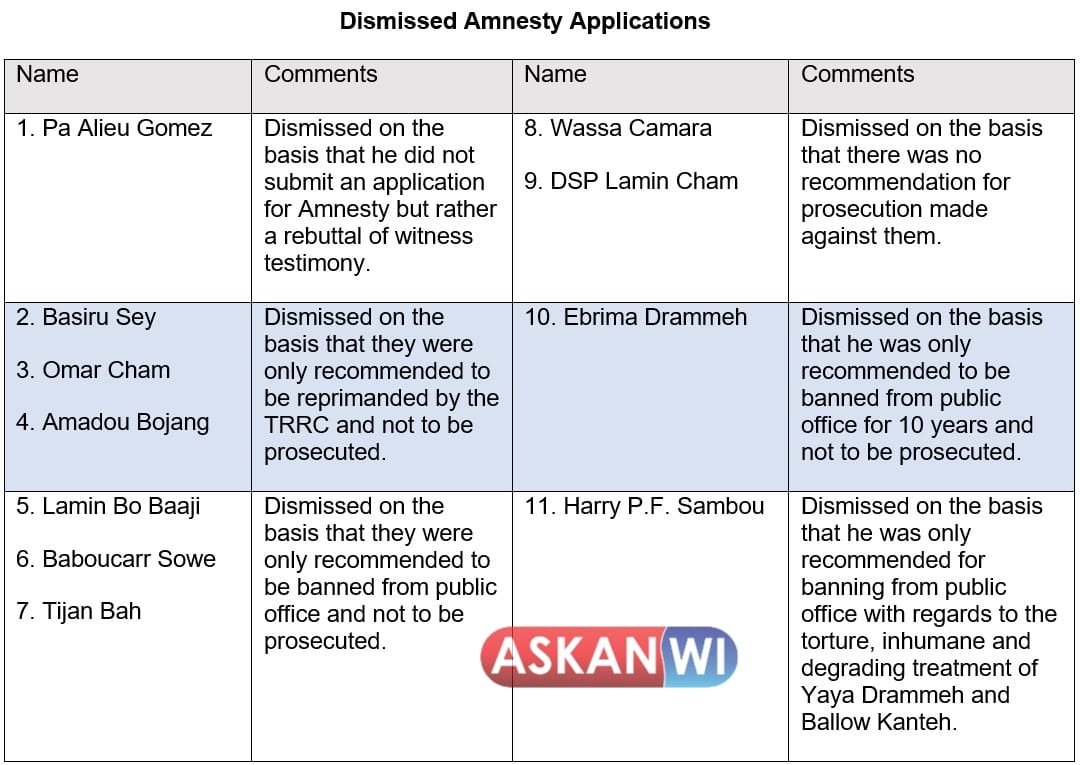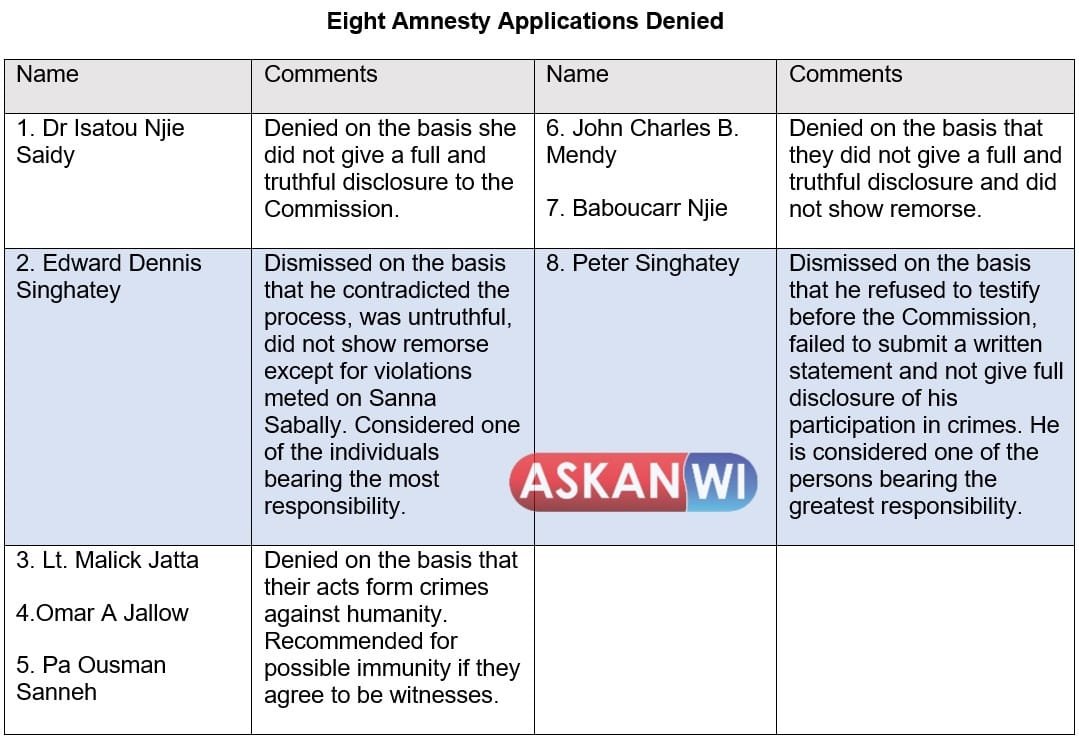Explainer: Why The Gambia Gov’t Rejected Only One Amnesty Application Recommended by the TRRC?
Applications for amnesty over alleged gross human rights violations were denied by the Truth Commission and the Gambia government for the following: L-R: Sanna Sabally, a former Junta Vice Chairman; Isatou Njie-Saidy, former Vice President; Edward Singhatey, former Junta Member (Photo Credit: TRRC)
By Yusef Taylor, @FlexDan_YT
The outrage which met the revelation that the Truth, Reconciliation and Reparations Commission (TRRC) had accepted the Amnesty of the second in command of the Military Junta which ushered in the 22-year misrule of the Armed Forces Provisional Council was quenched by the Government’s decision not to grant him Amnesty.
A review of The Gambia Government’s White Paper has revealed that out of the 25 Amnesty Applications received by the TRRC, only five were accepted by the Commission.
The TRRC then made five recommendations to the government to grant amnesty, out of which, one was rejected by the government.
The TRRC, which completed its work in 2021, was established in 2017 by an Act of Parliament “to investigate and establish an impartial historical record of the nature, causes and extent of violations and abuses of human rights committed during the period July 1994 to January 2017 and to consider the granting of reparations to victims and connected matter”.
Section 19 of the TRRC Act 2017 provides that “the Commission may recommend the granting of amnesty under the terms and conditions established by the Commission on the application by a person who makes a full disclosure of his or her involvement in human rights violations or abuses and expresses remorse for their acts or conduct”.
After concluding its public investigations, and hearings and submitting its report to the government back in November 2021, the Gambia government published its White Paper on 25th May, 2022 highlighting Amnesty Applications which it accepted and rejected from the TRRC’s Amnesty Committee.
In total, the TRRC received 25 applications for amnesty and made determinations on all of them. The Government’s White Paper on the TRRC Recommendations for Amnesty prescribed that out of the 25 “applications received, 11 were dismissed and 8 were denied” by the Commission.
However, out of the five approved by the TRRC, one was rejected by the Government, and another application for amnesty was referred “to the Attorney General for finalisation of granting of immunity”.
Some of the most prominent individuals who applied for amnesty include former Junta Vice Chairman of the Armed Force Provisional Council, Sanna Bairo Sabally, the 1994 Coup Mastermind, Junta Leader, Edward Singhatey, and former Vice President, Isatou Njie Saidy who is said to have refused to act to avert the death of children in the 10th and 11th April 2000 students’ massacre.
Eleven Amnesty Applications Dismissed
All of the eleven applications for amnesty that have been dismissed by the TRRC are because none of the applicants were recommended for prosecution, instead, some of the applicants have been recommended for dismissal and to be banned from public office. Below is a list including the reasons for their dismissal.
Tabulated by Yusef Taylor from Government TRRC White Paper (c) Askanwi
Four Recommendations for Amnesty Accepted
Baboucarr Mboob and Zakaria Darboe: Both adversely mentioned persons, were recommended to be granted amnesty from the Government by the TRRC’s Amnesty Committee on the “basis that he was truthful in his testimony, gave a full disclosure and showed remorse”.
Baboucarr Mboob and Zakaria Darboe: However, the Government noted that their granting of Immunity was “subject to his provision of witness evidence in line with the Prosecution Strategy”.
Bubacarr Bah: Similar to Baboucarr Mboob and Zakaria Darboe, the Commission noted Bubacarr Bah’s cooperation with the Commission, accepting responsibility and showing remorse. In addition to this, the TRRC’s Amnesty Committee noted that Major Bah “further participated in a reconciliation activity with the victim”. The government also accepted the recommendation to grant him Amnesty on the same basis of providing witness evidence in the future.
Alagie Kanyi: Kanyi’s case appears unique because the Government noted his testimony was crucial in unveiling the truth behind the murder of Ousman Koro Ceesay as well as securing the conviction of Yankuba Touray for this murder. The government white paper explains “that there might be a need for some legislative enactments to cater for the granting of immunity, the Government will work towards finalising the immunity arrangement for Alagie Kanyi”.
Eight Amnesty Applications Denied
Of the 25 applications for amnesty, the TRRC denied the following:
Tabulated by Yusef Taylor from Government TRRC White Paper (c) Askanwi
One Amnesty Rejected and One Administrative Error
According to the Government White Paper, the Attorney General is to Determine the status of one Amnesty Application due to an administrative error.
The government’s publication notes that the TRRC Recommendations states that “the Commission recommended the dismissal of the application by Yusupha Sanneh on the basis that it was a case of mistaken identity. The Commission’s report should have referred to Mustapha Sanneh instead”.
1. To rectify the error “the Commission resolved to write to the Attorney General to inform him of the mistake, to apologise to Yusupha Sanneh and inform Mustapha Sanneh of his recommendation for prosecution as well as inform him he could apply for amnesty if he so desired”. In response to this, the Barrow “Government accepts this recommendation. The government notes further from the Commission’s report that no application for Amnesty was made by Mustapha Sanneh”.
So, it is anticipated that Mustapha Sanneh could still face prosecution.
2. The only Amnesty Application recommended by the TRRC which was rejected by the Government is former Junta Vice Chairman, Sanna Bairo Sabally. “The Commission recommended the granting of Amnesty to Sanna Bairo Sabally on the basis that he served time in prison for false crimes levied against him. The Commission further noted that he gave full disclosure, showed remorse and initiated and participated in reconciliation with a perpetrator. The Commission finally noted that Sanna’s crimes precede the Rome Statute and cannot be applied retroactively. The Commission recommended him for community service”.
Not in agreement, the White Paper states that “the Government rejects the recommendation of the Commission as pertains to Sanna Sabally and notes that although he might have made full disclosure and showed remorse, Sanna is one of the individuals that bears the highest responsibility for gross human rights abuses and violations in the early days of the Jammeh regime, particularly the extrajudicial killing of many soldiers on November 11th, 1994”.
When the TRRC announced that Sanna Sabally’s Amnesty Application was granted, the Victim Center for Human Rights Violations held a press conference condemning the decision. Well, it seems that the Government has heard those concerns and decided to reject the TRRC’s Recommendation for Sanna Sabally to be granted Amnesty.
This article was first published on FactCheckGambia.org in the link below. https://factcheckgambia.org/explainer-why-the-gambia-government-rejected-only-one-amnesty-application-recommended-by-the-trrc/



